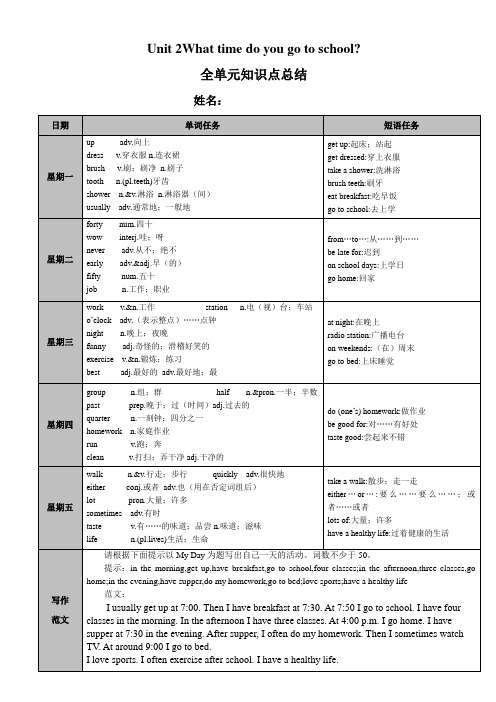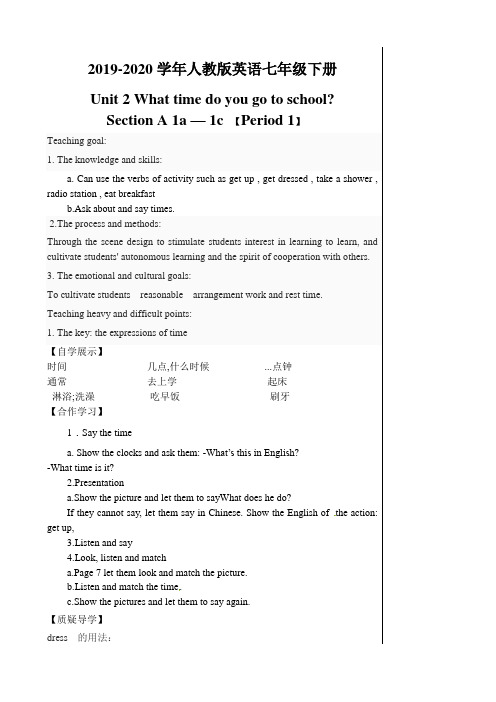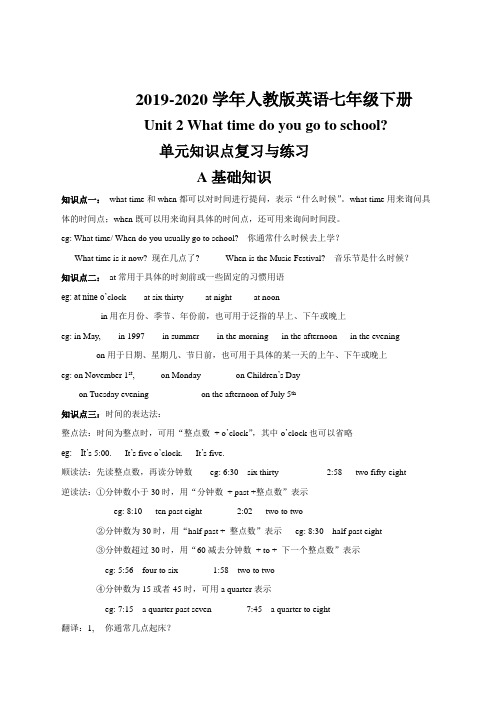2019-2020年七年级英语下册 Unit 2 How do you come to school同步检测 北京课改版
2019-2020年人教版英语七年级下册Unit2Whattimedoyougoto

2019-2020 学年人教版英语七年级下册Unit 2 What time do you go to school?Period 1 Section A (1a\1b\1c)一、导学目标: 1. 学会相关平时生活活动的词汇:get up, get dressed, go to school, brush teeth,eat breakfast, take a shower, usually, forty 等;2.学会时间的表达和问答平时作息时间。
二、演讲笔录:请仔细倾听同学的演讲并记录你学到的新单词和气句子。
三、语言感知:1、新词识记(翻译)向上 (adv.) _______ 穿衣服,连衣裙(v./n.) ________ 刷 (v.) _______牙齿 (n. 单 / 复数 ) _______ 往常地(adv.) _______ 四十 (num.)_______2、句型练习(翻译)你往常几点沐浴?______________________________________________________ 我往常六点四十沐浴。
__________________________________________________ 四、讲堂检测:(补全对话)A:1._________________________________________, Rick?B:Um, I usually get up at six thirty.A:2._____________________________________________________________?B:I brush my teeth and take a shower at six forty.A:Hmm. What time do you eat breakfast?B:3._________________________( 七点 )A:And 4.______________________________________________________?B:I usually get dressed at seven twenty.A: And my last question. 5. ________________________________________?B: I usually go to school at seven thirty.A: Thank you.五、小组评论:Unit 2What time do you go to school?Period 2Section A (2a\2b\2c\2d)一、导学目标: 1.学会词汇:never, early, fifty, job, work, radio station, o’clock, night, funny,exercise 等;2.可以听懂相关别人的平时生活对话;3.可以和伙伴讨论自己的平时作息话题。
【新】2019-2020学年度七年级英语下册基础训练Unit2Whattimedoyougotoschool讲义新版人教新目标版

教学资料参考范本【新】2019-2020学年度七年级英语下册基础训练Unit2Whattimedoyougotoschool讲义新版人教新目标版撰写人:__________________部门:__________________时间:__________________Words and Expressionsup /ʌp/ adv. 向上get up 起床;站起dress /dres/ v. 穿衣服n. 连衣裙get dressed 穿上衣服brush /brʌʃ/ v. 刷;刷净n. 刷子tooth /tuːθ/ n. (pl. teeth/ti:θ/) 牙齿 shower /'ʃaʊə(r)/n. & v. 淋浴n. 淋浴器(间)take a shower 洗淋浴usually /'ju:ʒuəli/ adv. 通常地;一般地forty /'fɔ:ti/ num. 四十wow /wau/ interj. (表示惊奇或敬佩) 哇;呀never /'nevə(r)/ adv. 从不;绝不early /'ə:li/ adv. & adj. 早(的)fifty /'fifti/ num. 五十job /dʒɔb/ n. 工作;职业work /wɜː(r)k/ v. & n. 工作station /'steɪʃn/ n. 电(视)台;车站radio station 广播电台o’clock adv. (表示整点)……点钟night /nait/ n. 晚上;夜晚funny /'fʌni/ adj. 奇怪的;滑稽好笑的exercise /'eksəsaiz/ v. & n. 锻炼;练习on weekends (在)周末best /best/ adj. 最好的adv. 最好地;最group /ɡru:p/n. 组;群half /hɑ:f/ /hæf/ n. & pron. 一半;半数past /pɑ:st/ /pæst/prep. 晚于;过(时间)adj. 过去的quarter /'kwɔ:tə/ n. 一刻钟;四分之一homework /'həʊmwɜːk/ n. 家庭作业do (one’s) homework做作业run /rʌn/ v. 跑;奔clean /kli:n/ v. 打扫;弄干净 adj. 干净的【2019最新】精选【新】2019-2020学年度七年级英语下册基础训练Unit2Whattimedoyougotoschool讲义新版人教新目标版take a walk 散步;走一走quickly /'kwikli/ adv. 很快地either /'aɪðə(r)/ /'iːðə(r)/ adv. 或者;也(用在否定词组后) either…or…要么……要么……;或者……或者……lot /lɒt/ pron. 大量;许多lots of 大量;许多。
新版(人教版)七年级(下)英语Unit2课文详解

新版(人教版)七年级(下)英语Unit2课文详解Unit 2 What time do you go to school?Section A 2a— 2d(P8)* 教师寄语:No man can do two things at once. 一心不可二用。
【学习目标】【学习重点】:1. 熟练掌握本课单词和短语.2. 学会谈论自己及他人的日常生活及日常作息习惯,并能合理安排.【体验学习】:用适当的词填空,补全下面的短文:My DayI usually _____ ____(起床)at 6:30. I have breakfast ______ (在) seven o’clock . After breakfast, I ______ ____ _____(洗澡)and then I ____ ___ ____(上学)at 7:30. I get to school at 7:40. I have five classes in the morning. And then I ______ _____ (吃午饭) at 12:00. In the afternoon, I have two classes. I ____ ______(回家)at 6:20. I get home at 6:30 p.m. I ______ _______(吃晚饭)at about 7:00. After dinner, I do my homework(做作业). I go to bed(睡觉)at 10:00. I am very busy(繁忙的)and happy every day.【课堂导学】:学习任务一:完成活动2a1.听录音,完成2a中的句子。
2.再听一遍录音,自己核实答案。
3.小组相互核对答案,检查所听结果。
4.小组为单位,谈论对话中的内容。
学习任务二:完成活动2b。
1.听录音,完成时间表。
2.再听一遍录音,自己核实答案。
2019-2020年人教版英语七年级下册Unit 2What time do you go to s

Unit 2What time do you go to school?全单元知识点总结姓名:知识点Section A:1.what time:“几点;什么时间”,其引导的特殊疑问句用来询问具体的时间点。
【辨析】①what time:意为“几点;什么时间”,用于询问具体的时间点(几点或几点几分);②when:意为“何时;什么时候”,用来询问年、月、日等,也可以询问具体时间点。
【1a】2.get dressed:“穿上衣服”。
dress:n.连衣裙v.穿衣服;①dress sb.:给某人穿衣服;②get dressed:穿上衣服(强调“穿”的动作);③be dressed in:穿着(强调“穿”的状态)【1a】3.【辨析】①at:用来表示在某一具体的时刻或用于表示某一时间的固定搭配中,eg:at five;at noon;②on:用在具体的日期、星期几、节日前,也可用来表示在具体某一天的上午/下午/晚上,eg:on Monday;on the morning of May 1st;③in:用在月份、季节、年份等前面,也可以用于表示“在早上/下午/晚上”,eg:in June;in the morning。
【1c】4.never:adv.“从不;绝不”,常用于be动词、情态动词或助动词之后,实义动词之前。
【2c】5.work:v.“工作”n.“工作”【辨析】①work:表示“工作”,是不可数名词,多指需要花费体力或脑力的努力或劳动;②job:是可数名词,多指为换取报酬而进行的日常活动,尤指作为某人的手艺、行业或职业。
【2d】6.from…to…:“从……到……”,介词短语。
eg:The boy can count from 1 to 100.【2d】7.o’clock:表示“……点钟”,用于整点的后面,多用于口语中,在许多情况下可以省略。
【2d】8.That’s a funny time for breakfast!:“那个时间吃早饭真有意思哟!”funny:adj.“奇怪的;滑稽可笑的”。
2019-2020年人教版英语七年级下册Unit 2 What time do you go to

2019-2020学年人教版英语七年级下册Unit 2 What time do you go to school?Section A 1a — 1c 【Period 1】Teaching goal:1. The knowledge and skills:a. Can use the verbs of activity such as get up , get dressed , take a shower , radio station , eat breakfastb.Ask about and say times.2.The process and methods:Through the scene design to stimulate students interest in learning to learn, and cultivate students' autonomous learning and the spirit of cooperation with others.3. The emotional and cultural goals:To cultivate students reasonable arrangement work and rest time.Teaching heavy and difficult points:1. The key: the expressions of time【自学展示】时间______________ 几点,什么时候___________...点钟______________通常______________ 去上学_________________ 起床_______________淋浴;洗澡__________ 吃早饭_________________ 刷牙______________ 【合作学习】1.Say the timea. Show the clocks and ask them: -What’s this in English?-What time is it?2.Presentationa.Show the picture and let them to sayWhat does he do?If they cannot say, let them say in Chinese. Show the English of the action: get up,3.Listen and say4.Look, listen and matcha.Page 7 let them look and match the picture.b.Listen and match the time.c.Show the pictures and let them to say again.【质疑导学】dress 的用法:1、He can’t get dresse d(=dress himself).他不会自己穿衣服。
2019-2020年人教版英语七年级下册 Unit 2 What time do you go to

2019-2020学年人教版英语七年级下册Unit 2 What time do you go to school?单元知识点复习与练习A基础知识知识点一:what time和when都可以对时间进行提问,表示“什么时候”。
what time用来询问具体的时间点;when既可以用来询问具体的时间点,还可用来询问时间段。
eg: What time/ When do you usually go to school? 你通常什么时候去上学?What time is it now? 现在几点了? When is the Music Festival? 音乐节是什么时候?知识点二:at常用于具体的时刻前或一些固定的习惯用语eg: at nine o’clock at six thirty at night at noonin用在月份、季节、年份前,也可用于泛指的早上、下午或晚上eg: in May, in 1997 in summer in the morning in the afternoon in the evening on用于日期、星期几、节日前,也可用于具体的某一天的上午、下午或晚上eg: on November 1st, on Monday on Children’s Dayon Tuesday evening on the afternoon of July 5th知识点三:时间的表达法:整点法:时间为整点时,可用“整点数+ o’clock”,其中o’clock也可以省略eg: It’s 5:00. It’s five o’clock. It’s five.顺读法:先读整点数,再读分钟数eg: 6:30 six thirty 2:58 two fifty-eight逆读法:①分钟数小于30时,用“分钟数+ past +整点数”表示eg: 8:10 ten past eight 2:02 two to two②分钟数为30时,用“half past + 整点数”表示eg: 8:30 half past eight③分钟数超过30时,用“60减去分钟数+ to + 下一个整点数”表示eg: 5:56 four to six 1:58 two to two④分钟数为15或者45时,可用a quarter表示eg: 7:15 a quarter past seven 7:45 a quarter to eight翻译:1, ---你通常几点起床?--- 我通常六点三十起床。
2019-2020学年人教版英语七年级下册Unit 2 What time do you go to
Discuss the routines about your classmates in group.
Then show your achievements to the class.
Step3
Sum2. Play the recording for the Ss to listen and repeat. Then let Ss work in pairs to practice reading the conversation. Then try to act it out.
3. Ask some pairs to come to the front and act out theconversation. See which group does best.
Let ss try to read the time in English.
(It's six o'clock. It's seven twenty.…)
2.Explain how to use the times in English.
Read the numbers directly; past ; to.
3.T: give an example :
I get up at 6:00.I go to school at 6:45....;
Then ask ss :What time do you get up?
Ask ss to practice the times again and over again.
①Where does Scott work?
②What time is his radio show?
人教版七年级英语下册第2单元How do you get to school?第5课时PPT课件
It’s 5 kilometers. It takes 20 minutes.
当堂练习
1. 你怎样到学校? 我骑自行车。 — __H_o_w__ do you __g_e_t__ to school? —I __ri_d_e__ my bike.
2. 花费多长时间到达学校? 大约15分钟。 —___H_o_w_ __lo_n_g__ does it __t_a_k_e_ ___t_o__ get to school? —It takes _a_b_o_u_t_ 15 minutes.
知识讲授
Language points
1. Thanks for your last e-mail. 谢谢你的上一封电子邮件。 Thanks for… 意为“谢谢你”,相当于Thank you for…,其后
常接名词或动名词,表示感谢的内容或原因。 例:谢谢你参加我的集会。
Thanks for coming to my party.
知识讲授 Make conversations with your partner.
How does Tony get to school?
He gets to school by bike.
知识讲授
How far is it from his home to school?
How long does it take to get to school?
授课老师:
知识讲授 2. Look at the chart below. Write at least five questions. Then answer the questions with the information in the chart.
2019-2020年人教版英语七年级下册Unit2 What time do you go to
2019-2020学年人教版英语七年级下册Unit 2 What time do you go to school?课型:新授课课时:第四课时(section B 2a—self check)主备人:【学习目标】1. 知识目标:熟练掌握本课单词和短语:quickly, either, lot,either…or…, lots of, sometimes, taste, life掌握句型:①I either watch TV or play computer games.②It tastes good.③She eats lots of fruit and vegetables for lunch.2.能力目标:理解本课短文,并学会写一段话谈论自己的日常生活,及日常作息时间。
3.情感目标:学会有一个健康的生活习惯。
【重点】学会写一段话谈论自己的日常生活,及日常作息时间。
【难点】在训练阅读能力和写作能力的基础上继续谈论人们的日常生活。
【自主预习】英汉互译。
1. 在下午_________2.在傍晚、晚上________3.做家庭作业________4. 回家________5. have breakfast__________6. eat dinner_____7. 很快地_____ 8. 或者,也_____ 9. 要么……要么……_____10. 大量;许多_____ 11. 有时_____ 12. 品尝_____13. go to bed early _____ 14. eat ice-cream_____ 15. eat quickly_____ 16. eat vegetables_____ 17. play sports _____ 18. take a walk _____ 【拓展提高】1. In the evening, I either watch TV or play computer games.either…or…用法简介:主要用于表示选择,其意为_____ ,用于连接两个性质相同的词或短语。
2019-2020年人教版英语七年级下册Unit 2 What time do you go to
二、预习过SectionA2d-3b后,请快速翻译下列句子。.
1他们通常在周末做运动。
They__________.
2.Tony通常什么时候去上班?
When _____ _______ ________ ____ _____ _____ ?
5. My grandfather ___________(锻炼)every morning.
教后反思
half past sixseven thirty
a quarter past nineten to ten
eleven fiftyten past twelve
half past twelvea quarter to two
V达标训练
一.根据句意用适当形式填空。
1. People like watching TV(在晚上).
2. He ________(brush) his teeth and __________(have) a shower..
3. It's7 o'clock. Let's _____ (go) home.
4. The workers work ____ ___(在周末). They are very tired.
2019-2020学年人教版英语七年级下册
教学设计
总第8期
年级
七年级
学科
英语
授课时间
主备人
主审人
七年级备课组
课题
Unit2 What time do you go to school?Section A(2d-3c)
课时
- 1、下载文档前请自行甄别文档内容的完整性,平台不提供额外的编辑、内容补充、找答案等附加服务。
- 2、"仅部分预览"的文档,不可在线预览部分如存在完整性等问题,可反馈申请退款(可完整预览的文档不适用该条件!)。
- 3、如文档侵犯您的权益,请联系客服反馈,我们会尽快为您处理(人工客服工作时间:9:00-18:30)。
2019-2020年七年级英语下册 Unit 2 How do you come to school同步检测北京课改版I. 根据句意和首字母补全单词。
*1. Mrs. Brown’s cat is m________. She is very worried.**2. Lin Tao is looking for Gogo in the n________.*3. It’s very cold outside, you’d better s________ in the room.**4. Tom gets up very late every day, so he goes to school w________ breakfast.5. It’s time for lunch, I f________ very hungry.II. 用所给词的适当形式填空。
*1. Don’t be ________ (worry) about his English. He can learn it well.*2. Tom is a lovely boy, many people like ________ (he).3. Mike’s ________ (parent) are doctors. They work in the same hospital.*4. There are fifty students in our class. They come from different ________ (country).**5. They go to the zoo by subway. It takes ________ (they) 30 minutes to get there. *6. Tom is crazy about ________ (play) computer games, so he is weak in his study. *7. I have a dream, I want ________ (fly) into the space someday.*8. Are you interested in ________ (see) English movies?*9. There aren’t ________ (some) flowers in front of the house.*10. We go to school by bike. It takes ________ (we) 15 minutes to get there.III. 单项选择:1. ——What’s your favorite ________ of transportation to school?——By subway.A. carB. dreamC. hobbyD. means2. My school begins at 8 o’clock in the morning. So I have to ________ school before 7:50 a.m.A. live atB. finishC. get toD. leave3. ——________ is your home from the library?——About five miles.A. How oldB. How farC. How longD. How often4. ——Oh, the meeting begins. Can I call my friend now?——Sorry. No one should make a phone call ________ the meeting.A. beforeB. afterC. forD. during5. Jeff goes to work ________ and his wife goes to work ________.A. by car, on bikeB. by a car; on a bikeC. by car; on her bikeD. by his car, in her bike6. Uncle Lee, could you ________ me to the nearby supermarket in your car?A. askB. putC. driveD. keep7. It’s very warm, you can sheep ________ the house.A. aboveB. outsideC. belowD. inside8. It always ________ me a whole day to do the gardening to Saturday.A. getsB. hasC. takesD. uses9. ——Who is on duty today?——It’s ________.A. IB. myC. mineD. me10. ——Do you go to school by bus every day?——Yes, I ________ take a bus.A. usuallyB. mayC. sometimesD. canIV. 根据中英文提示完成下列各句.1. 你家离超市多远?*________ is your home from the supermarket?2. 李萍家紧挨着学校,她每天步行去上学。
**Li Ping lives ________ her school. She goes to school ________ every day.3. 你每天开车去上班需要多长时间?**________ does it ________ you ________________ every day?4. 邮局离这里大约3公里远。
**The post o ffice is ________ 3 ________________________ here.5. 香港离北京很远,坐飞机需要一个半小时。
**Hong Kong is ________________________ Beijing. It will________________________ hours to get there ________________.6. 外面下雨了,我想坐公共汽车去上学。
**It’s rainin g outside. I want ________________________________________. 7. 离开教室时,不要忘了关窗户。
**________________ the window when you leave the classroom.8. 坐火车去上海是很便宜的。
**________________ to take a train to Shanghai.V. 完形填空。
Peter is a middle school boy. His father has a black car, so his father usually ____1____ him to school in the car. Peter’s best friend Ben goes to school by ____2____, because he thinks it is good for his health. So Ben often ____3____ Peter to ride a bike with him together. Peter thinks Ben is ____4____.After he goes home, Peter says to his mother, “Mom, I would like to ____5____ a bike. Would you please buy one ____6____ me?”His mother smiles and asks, “____7____ do you want to ride a bike to school?”“First, it’s g ood for my health. Second, there are a lot of ____8____ on the road, so it is faster (更快的)to ride a bike to school.”“____9____. Let’s go to the supermarket and choose (挑选)one. But you must be ____10____ to ride a bike on the way to school.”()1. A. has B. gets C. tells D. drives()2. A. train B. bike C. taxi D. subway()3. A. likes B. helps C. asks D. stops()4. A. sad B. right C. shy D. nice ()5. A. draw B. mend C. play D. have ()6. A. on B. to C. for D. from ()7. A. What B. How C. Why D. When ()8. A. policemen B. traffic lights C. traffic accidentsD. traffic jams()9. A. See you B. No problem C. Here you are D. Not at all()10. A. careful B. ex cited C. comfortable D. dangerousVI. 阅读理解。
AAn old man has a very clever monkey. He gives him food and teaches him to do some things. So the monkey likes to live with the old man. Someti mes the old man is out, and his monkey guard home for him. One afternoon, the old man is sleeping (睡觉) on his chair under the tree at his backyard. A mosquito (蚊子) flies around him. The monkey finds it and tries to catc h the mosquito, but he can’t. And then the mosquito stops on the old man’s face. The monkey is ve ry angry, so he picks up a stone ... The mosquito is dead (死的), but the old man gets very angry with the monkey. Do you know why?根据短文内容,选择正确答案。
